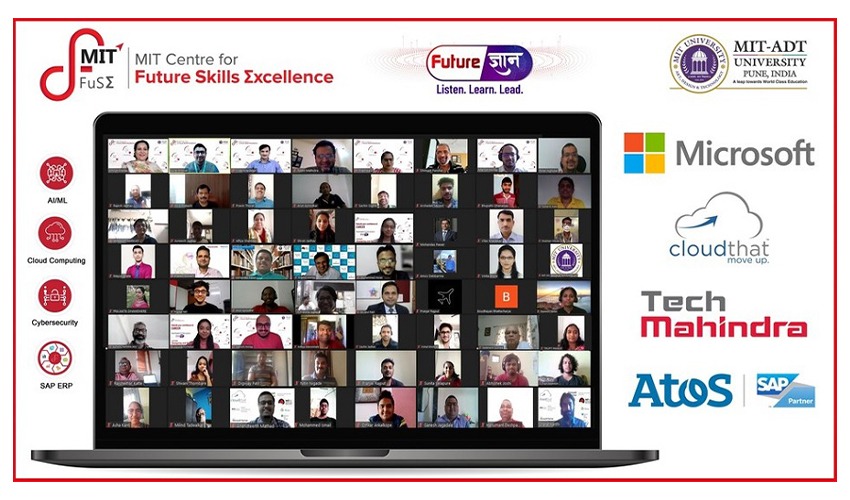MIT Centre for Future Skills Excellence to Offer Diploma in AI/ML, Cloud Computing, Cybersecurity, DevOps
The tailor-made skill-based certification aims to help the student community, graduates and working professionals overcome the loss of learning opportunities due to the global pandemic
To provide India’s working professionals and graduates with the opportunity to further their ambition with specialized online programs that make them ready for future careers, MIT Art, Design & Technology University has launched the MIT Centre for Future Skills Excellence to remain ahead of the curve. With its unique super-specialized and industry-aligned online programs curated in association with global leaders like Microsoft, Atos, SAP and CloudThat Technologies, MIT Centre for Future Skills Excellence (MIT-FuSE) aims to transform and empower careers that will drive tomorrow’s economy.
MIT Group of Institutions has over the years acclaimed success and renowned acceptance for its engineering and technology programs, it is now preparing to foray into the new-age Data science, AI/ML, Cloud computing, Cybersecurity, DevOps, Internet of Things, Blockchain, RPA, SAP-ERP, and technology domain to provide India’s white-collar workers with future-ready skills.
The tailor-made skill-based certification powered by MIT ADT University will surely help the student community, as well as fresh graduates and working professionals, overcome the loss of learning opportunities as a result of the global pandemic.
Prof Dr Mangesh Karad, Executive President & Vice-Chancellor said that digital skilling is a fundamental building block for making India self-reliant and empowering everyone to succeed in an upcoming gig economy. He also emphasized that the strategic associations with industry partners will help the students in the state get hands-on with technology and learn solutions for the future through the unique engagement module of the Internship. He complimented the association with CloudThat and Microsoft, giving a fillip to the higher education ecosystem and bridge the gap between Industry-Academia.
Prof Suraj Bhoyar, Project Director, MIT-FuSE said that these diploma programs are aimed to create a holistic and scalable skilling experience which includes access to learning content on Microsoft’s learning resource centre, Microsoft Learn, supplemented with experiential learning through hands-on lab exercises and industry certifications. He said, “It is a great opportunity to transform the quality of online learning and building a robust framework for the future to attract the best talents in the country to join these programs.”
Prof Suraj Bhoyar also highlighted the recent Future Gyaan TechTalks Series hosted by the MIT Centre for Future Skills Excellence from April 23 to May 01, 2021, which featured TechTalks on emerging technologies with real-life case studies and career tips with the motto of ‘Listen. Learn. Lead.’ where around 2300+ career enthusiasts got benefitted through interactions. Through Future Gyaan TechTalks Series, Manish Honap from Nvidia, Rohan N. from TCS, Tushar Kute from MITU Research, Mahesh Bhargava from CDAC, Dr Raja N. Moorthy, Bhavesh Goswami & Prarthit Mehta from CloudThat and Nikhil Malhotra from Tech Mahindra engaged the powerful sessions with career tips as resource speakers.
MIT Centre for Future Skills Excellence (MIT-FuSE) is distinctive in its approach, as it uses an amalgamation of the best industry practices and technologies across all aspects of learning pedagogy, making it truly a great online learning experience. All programs are delivered online through an interactive LMS ensuring that quality education is made accessible to the working professionals and graduates residing across India. The next cohort of AI/ML, Cloud Computing & Cybersecurity will start in June 2021.
It is important to remember that only those who invest enough in upskilling and improving their current abilities will succeed in the future. The ever-changing nature of the future business world necessitates that aspirants continue to push for new paradigms of information and capabilities.



